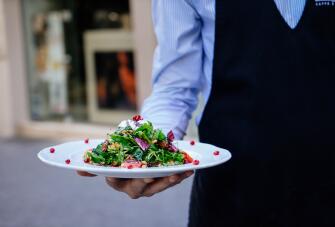How to Start a Bakery
Everybody loves a bakery. What better smell is there than the smell of a freshly baked croissant, bloomer, or baguette? The American Bakers Association estimates that the annual economic impact of baked goods on the country totals $423 billion [1]. So, there’s a lot of money to be made by becoming a baker.
If you’re looking to open your own bakery, this blog is for you. We'll cover the questions you need to ask yourself, how to create a business plan, what you need to research, and more. Here’s everything you need to know about opening your very own bakery.
Ask yourself why
The most important thing you can do when starting a new business is ask yourself the right questions. Dig down into your personal motivations to uncover the truth about why you’re doing what you’re doing. Doing this early on can help you determine if you’re starting your business for the right reasons.
Some questions to ask yourself might include:
- Is there a genuine demand for what I’m selling?
- Do I have experience/enthusiasm for this industry?
- Is this business sustainable for as long as I want it to be?
If you’re starting a business because someone else wants you to do it, because you’re chasing a trend, or because your enthusiasm for your idea hasn’t yet found sufficient demand, you may want to think about investing your time and effort into another venture.
Choose the type of bakery
Once you’ve asked yourself the tough questions, it’s time to figure out what kind of bakery you want to open. There are several different types of bakeries to choose from.
Retail bakery
A retail bakery sells baked goods directly to customers. These are your local bakeries and baked goods shops that most people buy their baked goods from. Retail bakeries sell through their own location rather than through distributors or other businesses. They usually make their own products on site. There are a few different kinds of retail bakeries you could open:
- Bakery cafe: This is a bakery where people are able to sit in with their food and eat. These bakeries often have small kitchens to prepare small meals like sandwiches, soups, and other times.
- Counter service bakery: These kinds of bakeries only sell their baked goods to customers who wish to take them away. There aren’t usually areas to sit down and eat inside.
- Food truck bakery: These bakeries are mobile. Owners take their food trucks to locations with a lot of foot traffic and sell to the people who pass. Some of these food trucks have ovens on board where they can bake products on the spot.
- Speciality bakery: These bakeries specialize in baking a select few items
Wholesale bakery
A wholesale bakery usually sells baked goods to other businesses, like restaurants and grocery stores, in bulk. These bakeries usually rely on steady commercial contracts for their income, so their sales are not limited by the whims of their customers. Most wholesale bakeries don’t have dining areas, either.
Freelance bakery
These bakeries are usually conducted in the home, and are usually run by amateur bakers. Many freelance bakers sell their products at events like farmers markets or online.
Create a business plan
Once you’ve chosen the type of bakery you want to open, it’s time to create a business plan. If you’re looking to secure investment, you may need to create a business plan to show investors that you know what you’re doing and where you’re going with your business.
A good business plan will contain:
- Executive summary: This will contain your mission statement and information about the company leadership, employees, operation, and location.
- Products and services: In this section, you will outline what products and services you will offer to your customers. It may also include information on pricing, product lifespan, and USPs.
- Market analysis: Your market analysis will contain an assessment of the market and your competitors. You will also outline the expected demand for your products and services.
- Marketing strategy: Here, you will outline how you intend to promote your products and services to your customers. You may outline things like intended distribution channels, advertising, media campaigns, and more.
- Financial planning: Here, you will include your projections for how your business will perform financially. This may include targets, expenses and estimates for the first few years.
- Budget: You will also need to include details on how you will manage your finances. This may include details on staffing, development, manufacturing, and more.
Research equipment, ingredients, and suppliers
The type of equipment you will need will depend on the type of bakery you want to open. For example, a food truck bakery may require specialized equipment when compared to a normal retail bakery. Settle on what kind of products you want to make and make a budget for the ingredients you’ll need.
You’ll also want to research potential suppliers for these ingredients. It’s important to shop around for the best suppliers for your ingredients, who will provide them at reasonable prices.
Research permits and licenses
You may be surprised to know that you may need permits and licenses to open your bakery. The food service industry is heavily regulated in most countries, and many businesses have to follow national and local regulations if they want to open a business and sell certain products.
Permits you may need when opening a bakery include:
- Electrical permit
- Patio permit
- Awning permit
- Waste placement permit
- Liquor license (if you choose to sell alcohol on your premises)
Check your national and local government websites for all the permits and licenses you may need to open your business.
Choose a location
A great location can make or break your bakery. If you’re setting up a retail bakery, your location will be supremely important to your success. You’ll want to choose a location that has a lot of foot traffic, like a main road or town centre. The more people you have passing your shop, the more customers you’re likely to attract. You may also want to choose a location where a retail bakery seems appropriate. You may ideally want to set up around other merchants that are appropriate to your business. For example, if you want to open a bakery that specializes in selling cookies for 50p, you won’t want to choose the space beside the Gucci store. Your bakery will have a fundamentally different target client than the Gucci store, so you’ll be unlikely to find the customers you want in that location.
Location matters less to wholesale bakeries as their customers are other businesses. If you’re opening a wholesale bakery, you want to choose a location that will accommodate your setup and logistics, and that’s ideally close to your customers so save on delivery costs.
Invest in tech
If you’re opening your very own retail bakery, there’s no better investment than in a state of the art point of sale (EPOS) system. A great EPOS system allows you to take your business by the horns and build it into something to be proud of.
With an Epos Now Bakery EPOS, you can:
- Track products and ingredients, including liquids, in real-time
- Allow customers to pay with cash, credit card, or even contactless options
- Track sales, staff performance, and more with powerful analytical tools
- Create a branded bakery loyalty scheme to encourage repeat buying
- Run your EPOS software on most Windows, Apple, and Android devices
- Login to your bakery at any time via remote cloud access
Contact Epos Now today to learn more about our systems.



